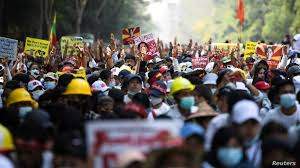Anti-Coup Protesters Fill Myanmar Streets, Ignoring Open Threat from Military Leaders

Protesters across Myanmar defied an ominous warning of deadly violence Monday as they gathered in large numbers for another day of demonstrations against the military’s overthrow of the civilian government.
Monday’s protests were coupled with a general strike that shut down scores of businesses, including factories and grocery stores. The strike was called for Sunday by the activist group Gen Z and the Civil Disobedience Movement, urging people to come together for a “spring revolution” on the “Five Twos,” a reference to the digits in Monday’s date, 22/2/2021, and a nod to the 8888 pro-democracy uprising in Myanmar on August 8, 1988.
A message carried Sunday on state-owned MRTV warned protesters “are now inciting the people, especially emotional teenagers and youths, to a confrontation path where they will suffer the loss of life.”
Ahead of Monday’s protests, security forces in Yangon placed roadblocks near some foreign embassies, which have become gathering points for protesters calling for foreign intervention. Security forces in Naypyitaw, the capital, arrested several protesters after scattering them and chasing them through the streets.
Tom Andrews, the U.N.’s special rapporteur for Myanmar, tweeted late Sunday that he was “deeply concerned” about the junta’s warning, adding a warning of his own: “Unlike 1988, actions by security forces are being recorded & you will be held accountable.”
Three people have already been killed as a result of the daily protests across Myanmar since the overthrow of the civilian government on February 1, including two people killed in Mandalay Saturday -- one of them a teenage boy -- when police and security forces used live and rubber bullets, tear gas, water cannon and slingshots against demonstrators.
An additional 20 people were wounded in Saturday’s violence, according to the head of a volunteer emergency service. The activist group Assistance Association for Political Prisoners says 640 people have since been arrested, charged or sentenced in connection with the military takeover.
One of those arrested is actor Lu Min, who was detained at his home in Yangon, according to a message posted on his Facebook page by his wife. Lu Min had taken part in protests in Yangon and was one of six celebrities the army said were wanted under an anti-incitement law. The army accused Lu Min of encouraging civil servants to join in the protest. If convicted, he faces a two-year prison sentence.
An internet shutdown Monday morning has been rumored in Myanmar, with the U.S. embassy among those warning people to be prepared for a blackout.
NetBlocks, which tracks internet disruptions and shutdowns, reported that Myanmar was back online from 9 am Monday after an eighth night of internet shutdowns imposed by the military
NetBlocks said that while connectivity is restored, online platforms remain filtered with indications that mobile data restrictions are now in place.
Sunday, Facebook took down the main page of the Myanmar military, known as Tatmadaw, citing the firm’s policy of prohibiting the incitement of violence, Reuters reported.
A company spokesperson said in a statement that the page was removed “for repeated violations of our Community Standards prohibiting incitement of violence and coordinating harm.”
On February 11, Facebook announced it was limiting the distribution of all content from the military’s pages and profiles “in line with our global policies on repeat offenders of misinformation.”
U.S Secretary of State Antony Blinken warned on Twitter Sunday that the United States “will continue to take firm action against those who perpetrate violence against the people of Burma as they demand the restoration of their democratically elected government,” referring to Myanmar’s previous name. “We stand with the people of Burma.”
U.N. Secretary-General Antonio Guterres condemned the deadly violence. "The use of lethal force, intimidation & harassment against peaceful demonstrators is unacceptable," he said on Twitter late Saturday.
Britain said it would consider further action against those involved in violence against protesters, and the French Foreign Ministry called the violence "unacceptable."
In a Twitter message, EU foreign policy chief Josep Borrell called on “the military and all security forces in #Myanmar to immediately stop violence against civilians.”
EU foreign ministers are to meet Monday to discuss possible sanctions.
In a statement released late Sunday, Myanmar’s Foreign Ministry called the messages “flagrant interference” in its internal affairs.
“Despite facing the unlawful demonstrations, incitements of unrest and violence, the authorities concerned are exercising utmost restraint through minimum use of force to address the disturbances," it said in a statement.
But security forces have grown increasingly aggressive against the protesters, who have clashed with them since the military detained de facto leader Aung San Suu Kyi and other high-ranking officials of the civilian government nearly three weeks ago.
The military declared a one-year state of emergency, citing widespread fraud in last November’s general elections, won in a landslide by Suu Kyi’s National League for Democracy.
The military’s claims were rejected by Myanmar’s electoral commission.
Senior Gen. Min Aung Hlaing, who led the coup, promised last week in a nationally televised speech that new elections would be held to bring what he called a "true and disciplined democracy,” but he did not specify when they would take place.
Photo: Reuters - Demonstrators protest against military coup in Yangon, Feb. 22, 2021.
Link: https://www.voanews.com/east-asia-pacific/anti-coup-protesters-fill-myanmar-streets-ignoring-open-threat-military-leaders











